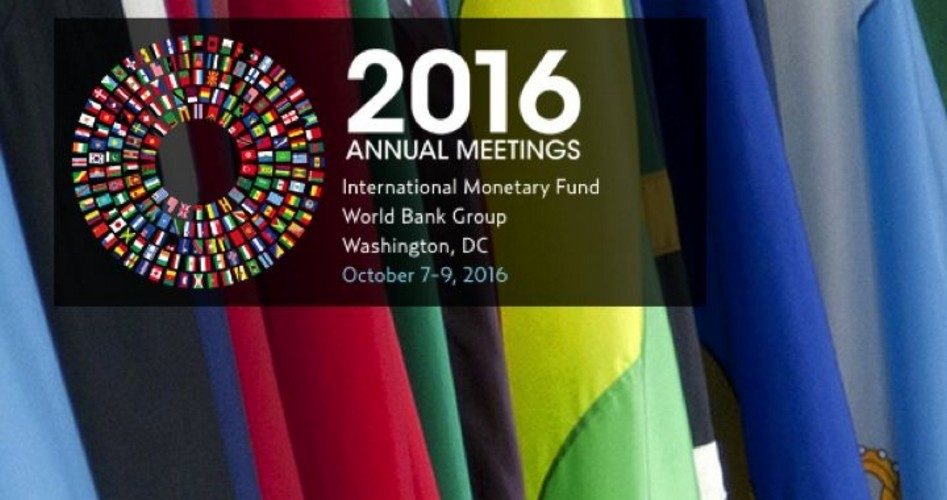
“The backlash against globalization is manifesting itself in increased nationalistic sentiment, against the outside world and in favor of increasing isolation.” This was the lament of Louis Kuijs, a former official with the International Monetary Fund (IMF), who now leads Asia Economics at Oxford Economics in Hong Kong.
IMF policymakers are plainly worried as they come together October 7-9 in Washington, D.C., for the annual meeting of the IMF and the World Bank. Founded in Bretton Woods, New Hampshire, in 1944, IMF’s stated purpose was the construction of an international payment system based on the American dollar, and the promotion of international trade.
Since World War II, globalization — the integration of all nations’ economies — has been a primary goal of these elites. But now, several factors have converged to threaten that objective, including the realization in a growing number of countries that globalization is actually disrupting national economies, and that national sovereignty is being lost as a result of so-called free trade deals.
Britain’s vote to leave the European Union (EU) this past summer was perhaps the most serious single blow suffered in decades in the push for a global government. The nomination of Donald Trump and his “America First” campaign was largely due to his opposition to trade deals that diminish American national sovereignty.
The IMF released its latest World Economic Outlook on Tuesday of this week, arguing that the anti-trade movement will further threaten a world economy plagued by stagnant wages. Interestingly, the Outlook indicated that U.S. economic growth is lagging behind world economic growth. The Outlook is predicting an economic growth for the world economy of 3.1 percent for this year, but a mere 1.6 percent for that of the United States.
The World Bank, which is meeting with the IMF this week, is a United Nations-associated institution that provides loans to developing countries. While its stated goal is to reduce poverty, in its Articles of Agreement it is clear that a commitment to international trade is the guiding principle of the organization. Together, the IMF and the World Bank are the twin pillars of the world establishment. Christine Lagarde, the managing director of the IMF, explained that the two organizations are hoping to achieve two goals during this week’s meeting: first, to successfully resist the efforts to throw up protectionist barriers to trade, and second, to take action to increase global economic growth.
Unfortunately for those who run the IMF and the World Bank, however, trade deals are extremely unpopular around the world. In the United States, both presidential candidates have publicly opposed the Trans-Pacific Partnership (TPP) trade deal. While Trump has consistently condemned the TPP during his campaign, Clinton has flip-flopped, originally strongly in favor of the deal while secretary of state for President Obama, even going so far as stating that the TPP “sets the gold standard in trade agreements.”
The TPP was a 12-nation trade agreement favored by the Obama administration, with the stated goal of eliminating trade barriers between the signatory nations, which include Japan, Australia, Malaysia, and the United States. The deal is intended to expand on the existing North American Free Trade Agreement (NAFTA), which the United States signed with Canada and Mexico back when Hillary’s husband was president. So far, Congress has failed to act on the TPP; however, there is a growing fear that it will be pushed through during the lame-duck session after the November elections.
Clinton flipped on the TPP in an effort to fight off the challenge of TPP opponent Senator Bernie Sanders (I-Vermont), arguing, “I did say, when I was secretary of state, three years ago, that I hoped it would be the gold standard. It was just finally negotiated last week (October 2015), and in looking at it, it didn’t meet my standards.”
And just what were Clinton’s standards? “My standards [were] for more new, good jobs for Americans, for raising wages for Americans. And I want[ed] to make sure that I can look into the eyes of any middle-class American and say, ‘This will help raise your wages.’ And I concluded I could not.”
This is not the first time that Hillary Clinton has flipped on a trade deal. She spoke publicly in favor of NAFTA when her husband negotiated it as president, but when it arose as an issue during the 2008 presidential campaign, she backpeddled, calling it a “mistake.”
Curtis Ellis, the trade advisor to Donald Trump, has called the 2016 presidential election a “referendum” on TPP, predicting that the outcome of the election will determine whether the TPP ultimately passes. “If we make it a referendum on the trade policies and TPP, Trump wins,” Ellis said. Despite Clinton’s present “opposition” to the TPP, an important ally of hers boldly predicted that she would flip back to supporting the pact were she to win the election.
While Clinton has vacillated on the TPP in the teeth of stiff opposition in the American electorate, Obama is still pushing the deal, arguing that its provisions make it the best trade pact liberals have ever seen. And the U.S. Chamber of Commerce and the National Association of Manufacturers continue to support it.
And, of course, the elites who run the IMF favor the TPP’s passage. “We’d like to see an end to the creeping protectionism in the world,” IMF’s research director, Maurice Obstfeld, told Bloomberg Television.
The opposition to globalization and the diminishing of national sovereignty is a world-wide issue. European globalists are extremely worried after the British vote to exit from the EU, fearing that with elections next year in France, Germany, and the Netherlands, such anti-EU sentiment might well spread and ultimately destroy the EU.
British Prime Minister Theresa May stated this past Sunday that the United Kingdom will begin the process of formal withdrawal from the EU early next year.
China certainly has reason to fear the anti-trade agreement sentiments sweeping the West. Daiwa Capital Markets estimates that a trade war would eliminate as much as five percent of China’s gross domestic product. While the communist regime ruling China has enjoyed the supposed “free trade” policies of the elites that dominate the IMF and the EU, they have refused to open many of their own industries to imports.
What caused this growing opposition to globalization and integration of the world economy? John Williamson, a former senior fellow at the Peterson Institute for International Economics, blames the 2008-09 financial meltdown. “There was agreement on globalization before the crisis and that’s one thing that’s been lost since the financial crisis.”
Of course, the advocates of globalization are by and large the same people who supported the policies that led to the financial meltdown of 2008. Former IMF chief economist Olivier Blanchard wrote a policy brief for the Peterson Institute in which he expressed amazement at “how anemic demand remains in the face of zero interest rates.”
But these are some of the very policies — central banks driving down interest rates below their market level — that led to the financial meltdown, and that now have contributed to a lack of confidence in the ability of the same elites who have pushed for globalization. Ludwig von Mises of the Austrian economics school predicted the Great Depression of 1929, in his opposition to a similar policy by the Federal Reserve System. Other Austrian economics school advocates such as Ron Paul rightly predicted that the same thing would happen in 2008, as a result of the “easy money” policy and low interest policy of the Federal Reserve.
The solution to economic stagnation is not more of the same — artificially low interest rates and trade deals that benefit communist regimes such as China, while reducing both the national sovereignty and the industrial base of Western countries — but rather a free market economy in all nations of the world.
That, however, is not what is desired by the IMF elites meeting this week in Washington. They are concerned that their power may be slipping away. This fact should give hope to all those who wish to preserve the national sovereignty of the United States.



